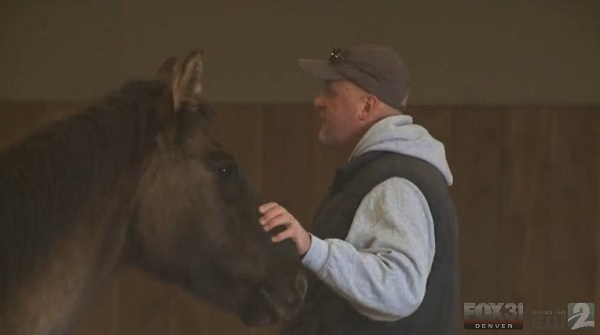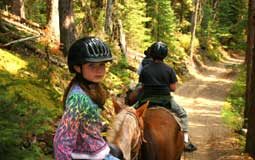 Equine Response aims to help first responders cope with PTSD through equine therapy. Screengrab via Fox31 |
Time and again we have seen the positive effects equine therapy has on veterans suffering from post traumatic stress disorder (PTSD). We may have even had personal experiences with horses that have proven therapeutic. But what about first responders – the police officers, firefighters and paramedics who arrive at the scene and deal with trauma and stress on a day-to-day basis?
While some state that it’s part of the job, officers should just deal with it and they knew what they were getting into, others, such as Bruce, a Longmont Police Department undercover officer, disagree. Bruce, whose identity is being protected because of his undercover work, told Fox31, “The old adage ‘put your big boy pants on and go back to work’ is just stupid. It’s antiquated and stupid, it’s not possible. Anyone who says it is has been lying to themselves for years. Nobody teaches us how to cope with that trauma. They teach us how to shoot, they teach us how to defend ourselves, they teach us how to write reports, they teach us what the law is. But no one is giving us coping skills to deal with it when we go.”
Bruce, along with a team of equine specialists, is working to change that. He chose equine therapy after experiencing the calming effects of being around horses firsthand. Fox31 reports that after he had to make a life-or-death decision, Bruce went home and spent time with his horse. “The situation turned out [in a way that] we were able to use less than deadly force, but but it was a very traumatic incident for everyone involved…The calming effect [of the horse] was tremendous. It brought my heart rate down. It made me feel safe. Made me feel like a human being again. It’s hard to feel like a human after some of the days that we have.”
An equine therapy program was the most logical answer when it came to helping others. The program, called Equine Response, uses the EAGALA (Equine Assisted Growth and Learning Association) method.
“It’s not about horsemanship skills, not about taking care of horses, groom horses, it’s really about the relationship with horses,” Michelle Kay, equine therapist, told Fox31. “The relationship you get being around a horse is unlike anything else. You’ve got a 1,200-pound animal right in front of you giving you automatic feedback. They can get coping skills, they can get relationship skills. Any stress or trauma a client is facing, they can work it out with the horses and extrapolate that into their human relationships and human lives.”
Equine Response is currently seeking funding and help spreading the word so that more first responders can easily get help. To find out more or to donate, visit the Colorado FOP Equine Response webpage.






horses are angels on earth
What is equine therapy? I wish this article used terminology correctly. There is no such thing as an equine therapist as well. It makes it sounds as if you are doing therapy on the horse, not utilizing the horse as part of the session. It is still unclear if this is equine-assisted learning, which is not therapy (instead directed learning and interacting with the horses) or equine-assisted therapy where a licensed mental health provider and/or therapist is utilizing the horse to address specific goals. Please do your research before writing such an article.
Equine “therapy” is an interesting idea but it is NOT therapy or a replacement for treatment by a licensed psychotherapist or psychologist.
Having had horses for 40 years as well as being in volunteer EMS for 10 years and working with many law enforcement agencies in my paying job as well as volunteer work and having a daughter who is an occupational therapist I feel I can safely say this article has a lot of Merit. Time spent with a horse receiving unconditional and non-judgemental response from that animal is far more beneficial than an hour in an office and going home with a bottle of pills. The previous posters missed the point. The idea is to not let these people get to the point where they have to be medicated into not caring what horrific things they have to deal with on a daily basis. Why in this day and age is a natural way of dealing with an issue inferior? Is it not insecurity. Are you feeling your job is threatened by a horse? If not maybe you should be? They can teach us humans a lot about behavior and life. NEVER underestimate the power of a horse. They have a way of humbling a human when they need it most. Ill put up with that side effect any day.
Regarding the comment below that equine therapy is not therapy by a licensed professional, the EAGALA model mandates that a team consisting of a licensed mental health professional along with an equine specialist offer the treatment. At all times a mental health professional must participate in the treatment session. Other equine therapy programs do not require this and this is what sets the EAGALA model apart from other programs.